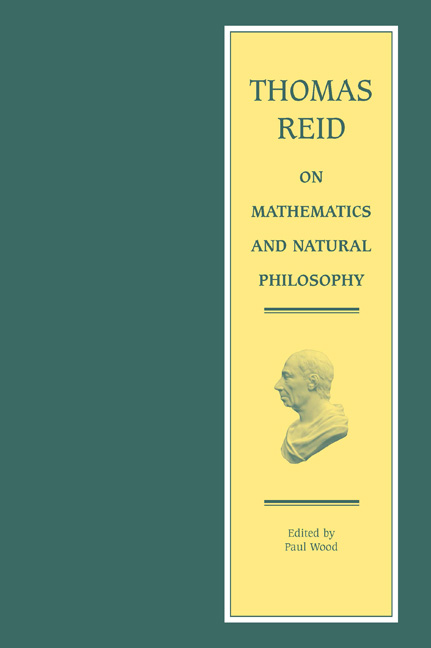Introduction
Published online by Cambridge University Press: 23 June 2018
Summary
Thomas Reid: Mathematician and Natural Philosopher
Thomas Reid was the offspring of a marriage linking two significant families in the north-east of Scotland. His father, the Rev. Lewis Reid, was a descendant of the Presbyterian clergyman James Reid, who in the late sixteenth century sired two notable sons: Thomas, who served as the Latin secretary to James VI and I, and Alexander, who eventually practised in London as a physician and surgeon. His mother, Margaret Gregory, was the eldest daughter of David Gregory, whose life as the Laird of Kinnairdie allowed him to study mathematics, medicine and natural philosophy and to correspond with leading men of science such as the French physicien, Edme Mariotte.1 Reid's fascination with the genealogical details of the Gregory family strongly suggests that he identified himself as a member of the notable line of mathematicians and natural philosophers spawned by his maternal grandfather, David Gregory. Reid's contemporaries also made this identification. For example, an anonymous biographer of his cousin, the physician John Gregory, asserted that Reid had ‘inherit[ed] largely the mathematical genius of his ancestors’. Yet Reid's most influential nineteenth-century biographer, Dugald Stewart, portrayed him as being, quintessentially, an anatomist of human nature. In downplaying his subject's mathematical and scientific predilections, Stewart obscured two important facts about Reid, namely that the catholicity of Reid's intellectual interests reflected the culture of the virtuosi in which he had been educated and that Reid was one of the most distinguished polymaths of the Enlightenment era. Because of the hold on the historical imaginary exercised by Stewart's biography throughout the nineteenth century and for much of the twentieth, scant attention was paid to Reid's scientific interests until the appearance of the initial volume of the Edinburgh Edition of Thomas Reid, which revealed for the first time the full extent of his work in the life sciences. Reid's lifelong engagement with the natural sciences is also in evidence in his correspondence published in the fourth volume of the Edinburgh Edition. The papers on mathematics and the physical sciences included in this volume of the Edinburgh Edition demonstrate that the image of Reid delineated by Stewart is one-dimensional.
- Type
- Chapter
- Information
- Thomas Reid on Mathematics and Natural Philosophy , pp. xvii - cxcivPublisher: Edinburgh University PressPrint publication year: 2017



